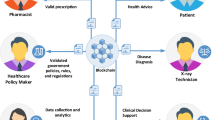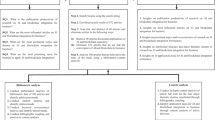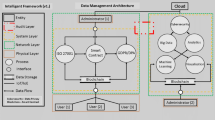Abstract
The Internet of Things (IoT), the convergence of blockchain and deep learning (DL) technologies presents exciting opportunities for innovation. The integration of a secured IoT architecture with a blockchain framework and DL technology offers a promising avenue for personalized marketing. The primary challenges in the realm of IoT-based personalized marketing are the vulnerability of user data and the need for a secure framework to protect sensitive information. The objective of the study is to develop a holistic solution by integrating blockchain technology and DL, offering a secure and personalized marketing architecture that safeguards user privacy while enhancing the effectiveness of targeted marketing strategies. Data collection, leveraging a blockchain network proves instrumental for expediting data transactions between the seed node and destination node while ensuring robust security measures. In this approach, a consortium blockchain integrates dispersed clusters of private to store encrypted data, increasing data transmission efficiency while ensuring operator privacy and security through off-chain storing and on-chain transmission synergy. The study then presented a lightweight hierarchical blockchain-based multi-chain code access control (AC) to safeguard the security and secrecy of IoT devices. Furthermore, federated DL is used to determine the best threshold and pertinent AC parameters, hence improving AC accuracy and privacy protection. Stacking involves training machine learning algorithms initially on training datasets and subsequently using these models to generate predictions for a new dataset. This new dataset, consisting of the predictions from the initial models, is then utilized as input for the ensemble algorithm. As a finding, the researchers presented an Ensemble Stacking approach combined with a deep long short-term memory-based intrusion detection method for detecting malicious or regular network traffic flow patterns in a cloud context. The proposed work is implemented using Python software. The findings show that the high accuracy value of 97.5% indicates the model’s proficiency in making precise and reliable predictions. The specificity value of 0.9045% indicates the maximum accuracy of the method. The accuracy reaches a remarkable 91.879%, outperforming the existing methods. The integration of a secured IoT architecture with a blockchain framework and DL technology offers a robust solution for personalized marketing while addressing challenges related to data refuge and privacy.










Similar content being viewed by others
Data availability
Enquiries about data availability should be directed to the authors.
References
Rane, N.: Enhancing Customer Loyalty through Artificial Intelligence (AI), Internet of Things (IoT), and Big Data Technologies: Improving Customer Satisfaction, Engagement, Relationship, and Experience. Internet of Things (IoT), and Big Data Technologies: Improving Customer Satisfaction, Engagement, Relationship, and Experience (October 13, 2023) (2023)
Singh, A.K.: Applications of the internet of things and machine learning using python in digital marketing. In: Global Applications of the Internet of Things in Digital Marketing. IGI Global, pp. 213–232 (2023)
Issa, W., Moustafa, N., Turnbull, B., Sohrabi, N., Tari, Z.: Blockchain-based federated learning for securing internet of things: a comprehensive survey. ACM Comput. Surv. 55(9), 1–43 (2023)
Alam, S., Bhatia, S., Shuaib, M., Khubrani, M.M., Alfayez, F., Malibari, A.A., Ahmad, S.: An overview of blockchain and IoT integration for secure and reliable health records monitoring. Sustainability 15(7), 5660 (2023)
Ismail, S., Reza, H., Zadeh, H.K. and Vasefi, F.: A blockchain-based IoT security solution using multichain. In: 2023 IEEE 13th Annual Computing and Communication Workshop and Conference (CCWC). IEEE, pp. 1105–1111 (2023)
Oudani, M., Sebbar, A., Zkik, K., El Harraki, I., Belhadi, A.: Green Blockchain based IoT for secured supply chain of hazardous materials. Comput. Ind. Eng. 175, 108814 (2023)
Jiang, P., Zhang, L., You, S., Van Fan, Y., Tan, R.R., Klemeš, J.J., You, F.: Blockchain technology applications in waste management: overview, challenges and opportunities. J. Clean. Prod. 421, 138466 (2023)
Zubaydi, H.D., Varga, P., Molnár, S.: Leveraging blockchain technology for ensuring security and privacy aspects in internet of things: a systematic literature review. Sensors 23(2), 788 (2023)
Wenhua, Z., Qamar, F., Abdali, T.A.N., Hassan, R., Jafri, S.T.A., Nguyen, Q.N.: Blockchain technology: security issues, healthcare applications, challenges and future trends. Electronics 12(3), 546 (2023)
Sharma, P., Namasudra, S., Crespo, R.G., Parra-Fuente, J., Trivedi, M.C.: EHDHE: enhancing security of healthcare documents in IoT-enabled digital healthcare ecosystems using blockchain. Inf. Sci. 629, 703–718 (2023)
Khashan, O.A., Khafajah, N.M.: Efficient hybrid centralized and blockchain-based authentication architecture for heterogeneous IoT systems. J. King Saud Univ. Comput. Inf. Sci. 35(2), 726–739 (2023)
Shrivastava, A., Krishna, K.M., Rinawa, M.L., Soni, M., Ramkumar, G., Jaiswal, S.: Inclusion of IoT, ML, and blockchain technologies in next generation industry 4.0 environment. Mater. Today Proc. 80, 3471–3475 (2023)
Abed, S.E., Jaffal, R., Mohd, B.J.: A review on blockchain and iot integration from energy, security and hardware perspectives. Wirel. Pers. Commun.. Pers. Commun. 129(3), 2079–2122 (2023)
Kirikkayis, Y., Gallik, F., Reichert, M.: Lifecycle support for IoT-driven business rules. Procedia Comput. Sci. 219, 193–200 (2023)
Umer, M., Sadiq, S., Alhebshi, R.M., Sabir, M.F., Alsubai, S., Al Hejaili, A., Khayyat, M.M., Mohamed, A.: IoT based smart home automation using blockchain and deep learning models. PeerJ Comput. Sci. 9, e1332 (2023)
Varma, I.M., Kumar, N.: (2023) A comprehensive survey on SDN and blockchain-based secure vehicular networks. Veh. Commun. 100663
Shammar, E.A., Zahary, A.T., Al-Shargabi, A.A.: A survey of IoT and blockchain integration: security perspective. IEEE Access 9, 156114–156150 (2021)
Alkadi, O., Moustafa, N., Turnbull, B., Choo, K.K.R.: A deep blockchain framework-enabled collaborative intrusion detection for protecting IoT and cloud networks. IEEE Internet Things J. 8(12), 9463–9472 (2020)
Rodríguez, E., Otero, B., Canal, R.: A survey of machine and deep learning methods for privacy protection in the Internet of Things. Sensors 23(3), 1252 (2023)
Khorram, S., Ergil, M.: Unified classical formula for non-cohesive total-load sediment transport in marine coastal zones. Cont. Shelf Res. 130, 79–92 (2020)
Far, S.B., Asaar, M.R., Haghbin, A.: A privacy-preserving framework for blockchain-based multi-level marketing. Comput. Ind. Eng. 177, 109095 (2023)
Keshk, M., Turnbull, B., Moustafa, N., Vatsalan, D., Choo, K.K.R.: A privacy-preserving-framework-based blockchain and deep learning for protecting smart power networks. IEEE Trans. Ind. Inf. 16(8), 5110–5118 (2019)
Kumar, P., Kumar, R., Kumar, A., Franklin, A.A., Garg, S. and Singh, S.: Blockchain and deep learning for secure communication in digital twin empowered industrial IoT network. IEEE Trans. Netw. Sci. Eng. (2022)
Kumar, R., Kumar, P., Aloqaily, M., Aljuhani, A.: Deep-learning-based blockchain for secure zero touch networks. IEEE Commun. Mag.Commun. Mag. 61(2), 96–102 (2022)
Kumar, R., Aljuhani, A., Kumar, P., Kumar, A., Franklin, A. and Jolfaei, A.: Blockchain-enabled secure communication for unmanned aerial vehicle (UAV) networks. In: Proceedings of the 5th International ACM Mobicom Workshop on Drone Assisted Wireless Communications for 5G and Beyond, pp. 37–42 (2022)
Kaur, B., Dadkhah, S., Shoeleh, F., Neto, E.C.P., Xiong, P., Iqbal, S., Lamontagne, P., Ray, S. Ghorbani, A.A.: Internet of things (IoT) security dataset evolution: Challenges and future directions. Internet Things 100780 (2023)
Funding
The authors have not disclosed any funding.
Author information
Authors and Affiliations
Contributions
All authors contributed to the design and implementation of the research, to the analysis of the results and to the writing of the manuscript.
Corresponding author
Ethics declarations
Competing interests
The authors declare no competing interests.
Additional information
Publisher's Note
Springer Nature remains neutral with regard to jurisdictional claims in published maps and institutional affiliations.
Rights and permissions
Springer Nature or its licensor (e.g. a society or other partner) holds exclusive rights to this article under a publishing agreement with the author(s) or other rightsholder(s); author self-archiving of the accepted manuscript version of this article is solely governed by the terms of such publishing agreement and applicable law.
About this article
Cite this article
Khandekar, A., Ahmad, S.F. Secured IoT architecture for personalized marketing using blockchain framework with deep learning technology. Cluster Comput (2024). https://doi.org/10.1007/s10586-024-04372-z
Received:
Revised:
Accepted:
Published:
DOI: https://doi.org/10.1007/s10586-024-04372-z




